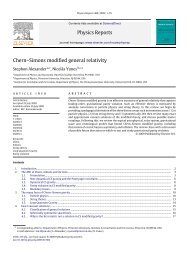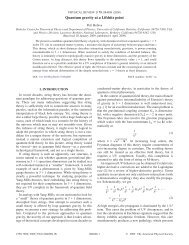Three Roads To Quantum Gravity
Three Roads To Quantum Gravity
Three Roads To Quantum Gravity
You also want an ePaper? Increase the reach of your titles
YUMPU automatically turns print PDFs into web optimized ePapers that Google loves.
174 THREE ROADS TO QUANTUM GRAVITY<br />
Argument for the Bekenstein bound<br />
Let us suppose that The Thing is big enough to be described<br />
both in terms of an exact quantum description and in terms of<br />
an averaged, macroscopic description. We shall argue by<br />
contradiction, which means that we ®rst assume the opposite<br />
of what we are trying to show. Thus we assume that the amount<br />
of information required to describe The Thing is much larger<br />
than the area of The Screen. For simplicity, we assume that The<br />
Screen is spherical.<br />
We know that The Thing is not a black hole, because we<br />
know that the entropy of any black hole that can ®t into The<br />
Screen must be equivalent to an area less than that of the<br />
screen. But in this case its entropy must be lower than the area<br />
of the screen, in Planck units. If we assume that the entropy<br />
of a black hole counts the number of its possible quantum<br />
states, this is much less than the information contained in The<br />
Thing.<br />
It then follows (from a theorem of classical general relativity)<br />
that The Thing has less energy than a black hole that would just<br />
®t inside The Screen. Now, we can slowly add energy to The<br />
Thing by dripping it slowly through the screen. We shall reach<br />
some point by which we shall have given it so much energy<br />
that, by that same theorem, it must collapse to a black hole. But<br />
then we know that its entropy is given by one-quarter of the<br />
area of the screen. Since that is lower than the entropy of The<br />
Thing initially, we have managed to lower the entropy of a<br />
system. This contradicts the second law of thermodynamics.<br />
We dripped the energy in slowly to ensure that nothing<br />
surprising happens outside The Screen which might increase<br />
the entropy strongly somewhere else. There seem to be no<br />
loopholes in this argument. Therefore, if we believe the<br />
second law of thermodynamics, we must believe that the<br />
most entropy that we, outside the Screen, can attribute to The<br />
Thing is one-quarter of the area of The Screen. And because<br />
entropy is a count of answers to yes/no questions, this implies<br />
the Bekenstein bound as we have stated it.



![arXiv:1001.0993v1 [hep-ph] 6 Jan 2010](https://img.yumpu.com/51282177/1/190x245/arxiv10010993v1-hep-ph-6-jan-2010.jpg?quality=85)


![arXiv:1008.3907v2 [astro-ph.CO] 1 Nov 2011](https://img.yumpu.com/48909562/1/190x245/arxiv10083907v2-astro-phco-1-nov-2011.jpg?quality=85)








![arXiv:1002.4928v1 [gr-qc] 26 Feb 2010](https://img.yumpu.com/41209516/1/190x245/arxiv10024928v1-gr-qc-26-feb-2010.jpg?quality=85)
![arXiv:1206.2653v1 [astro-ph.CO] 12 Jun 2012](https://img.yumpu.com/39510078/1/190x245/arxiv12062653v1-astro-phco-12-jun-2012.jpg?quality=85)
